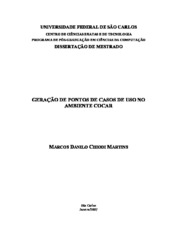Geração de pontos de casos de uso no ambiente Cocar
Abstract
The objective of this paper was to implement an initial version of a development support
environment named COCAR based on the Use Case Model. Even though the conception and
some features of this environment are the outcome of several other master papers, this work
emphasises the relevance of the Use Case Point metric (PCU). This metric strengthens the
usage of estimates which are of fundamental importance for the calculation of a system
development time. Furthermore, such a metric is associated to one of the main drivers of a
software product quality, which is the ability to meet delivery time. With the advent of the
object oriented development paradigm, the Use Case Point metric based on the Use Case
Model has been highlighted. However, given the lack of formality and standardization,
specifying and building these models a PCU metric may be jeopardized. In the scope of this
work, there have been relevant contributions to building such an environment implementing
a technique called TUCCA which helps with the model standardization, a functionality that
supports the insertion of system requirements in the environment and the generation of PCU
as in the model generated by TUCCA application. In the assessment process of the COCAR
environment an informal case study, in which a specification of actual software from a
development company, has been carried out, producing Use Case Models, PCU s and effort
estimates, both compared against the industry benchmarks. The results of this research
showed that for this particular situation the output from the COCAR environment were very
close to those defined by the industry.
